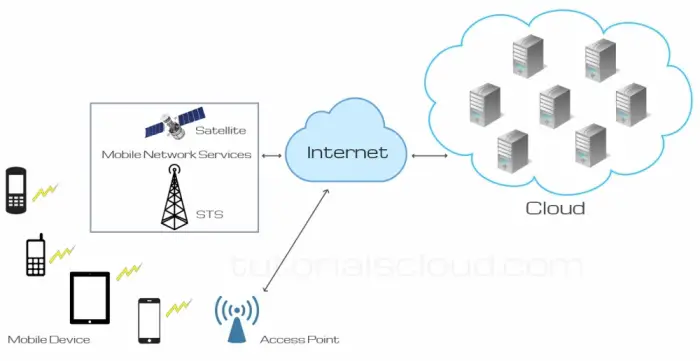Here, we will learn about the mobile phones and their interaction with the cloud. There lies a drastic change in the civilization because of the cell-phone technology. Cell phones fall under 2 categories:
- Featured Phones: which are phones with added capabilities.
- Smart Phones: that runs recognized operating systems, installing of applications and Internet connectivity.
Defining Mobile Cloud Computing
It is a package that contains the combination of cloud technology, mobile computing and wireless network. This combinational package brings enormous computational resources to cell phone users, network operators as well as cloud technology providers. Another aim of Mobile Cloud Computing (MCC) is to enable rich mobile execution on mobile devices which will be enriched with best user experience (UI).
Mobile Cloud Applications
It is defined as the software that is programmed to be accessed over the internet by various portable computing devices. There are two types of applications of mobile cloud that are almost similar. These are: mobile Cloud apps & Mobile web apps. Both of them runs on the mobile device's external server and in both the cases, data get stored externally and is accessed by a browser over the Internet.
Figure - Mobile Cloud Computing Architecture Diagram:

Adopting Mobile Cloud Applications
When we talk about "mobile cloud" and its technology, we describe a model where processing is done in the cloud, and the storage is also in the cloud, and the presentation platform is the mobile device. For this above-discussed model, the internet connection should have to reliable along with the cell-phone to run a browser (micro-browser). Applications that run on today's generation of cell-phones such as Android, iPhones, Windows Mobile, BlackBerry, RIM, etc. are processed locally on the phone, and hence these cell-phones are essentially the minimized form of computers.
Using Smartphones with Cloud Technology
There are various ways to define a smart-phone having the following characteristics:
- A smart-phone has a recognizable OS
- It provides advanced calling features (such as video calling and conferencing)
- That smart-phone must have the ability to run the installable application
- It must offer messaging features
- A smart-phone must have a persistent internet connection
As in the current situation of cloud, it is based on the idea that large industry sized information appliances can supply data and updates to all new and old comers. Now, all the mobile phones, tablets, and other hand-held devices are the clients of the cloud. We haven't experienced smart-phones with cloud features, and also haven't seen phone networks using peering. If a phone is designed in such a way that each phone acts as a node to a large distributed network, then the overall computers will have infinite capability and power. These smart-phones have made one thing very clear that the different types of apps used by mobile users are loved by every people and have massive demand on the competitive market and each vendor has an application marketplace.
The android market has 75000 - 78000 applications. Google's participation in the android market has extended to offer several web-services in the form of android applications. Some of these Google applications are:
- Google voice
- Google Finance
- Google translator
- Google Shopper
- Places Directory
- Google Chrome to phone extension
- Voice Actions for Android
The last two mentioned applications are new and worth mentioning and they are available on the market.
Understanding The Mobile Web Service
Mobile devices consume more network traffic for using web services. So, mobile devices put forwarded some challenges for web services. Specifically, their device characteristics do not match the resolution and details of desktop computers. That is why many service-protocols are particularly aimed at supplying necessary alteration to make websites look good on cell-phones. To use any web-service the device needs to know about that service and the way it can be accessed. Accordingly, the mobile device can transmit specific information about the condition of the device and the user.
Enabling Mobile Web Services
Enabling the mobile web-services will automatically enable the following other services, listed below:
- Enables web-service systems
- Enables in-built external services (i.e. Mobile Web services)
- Enable the rest protocol
- Enables XML-rpc protocols
- Enables the capabilities to authenticate user role
Benefits of MCC And Its Services
- Business saves money using Mobile Cloud Computing
- Enterprise owners can access cloud technology easily because of the portability which makes their work easy and efficient
- Cloud consumers have more features on their mobile phones
- Developers reach greater markets through the mobile cloud
- More network providers with their new set-up can join up in this field